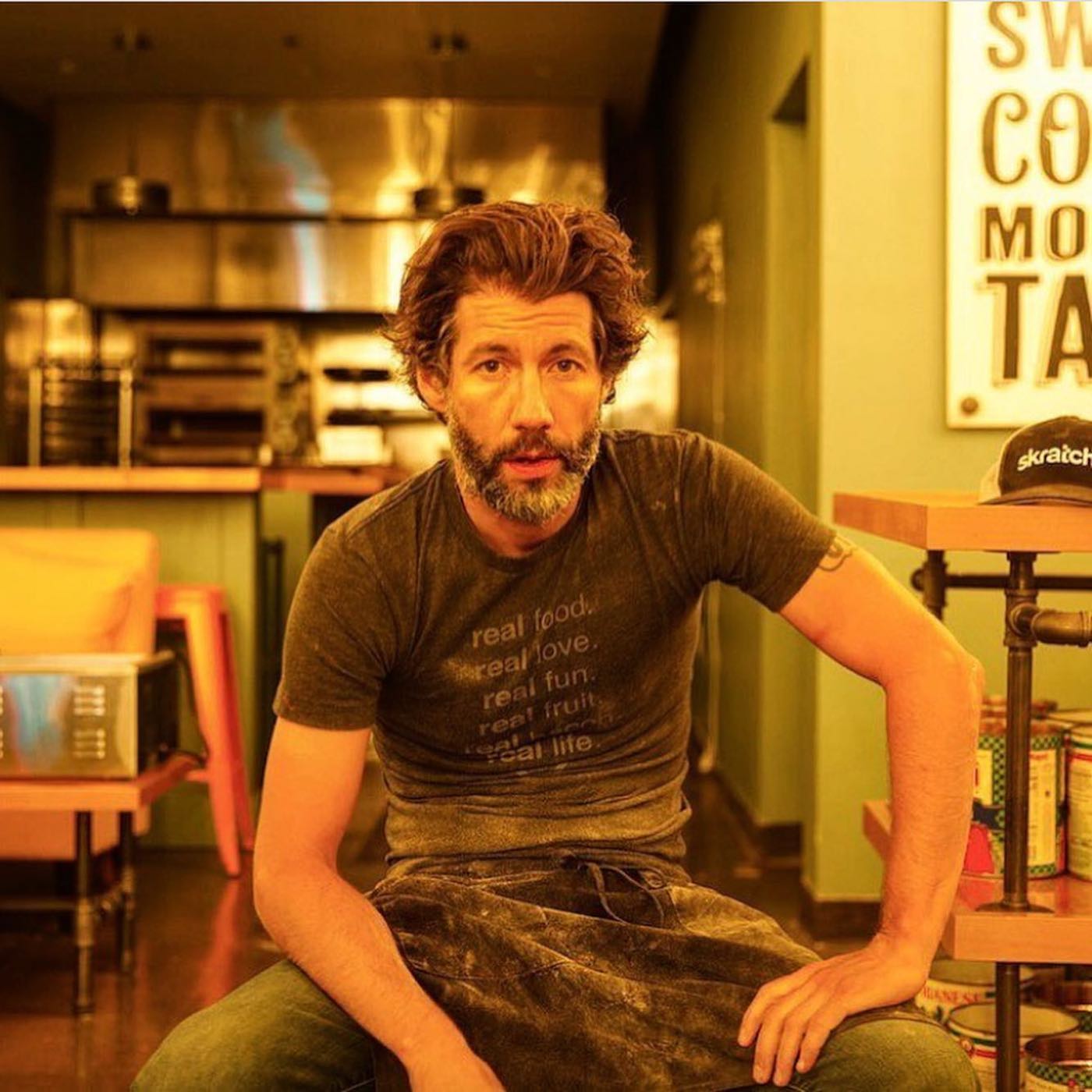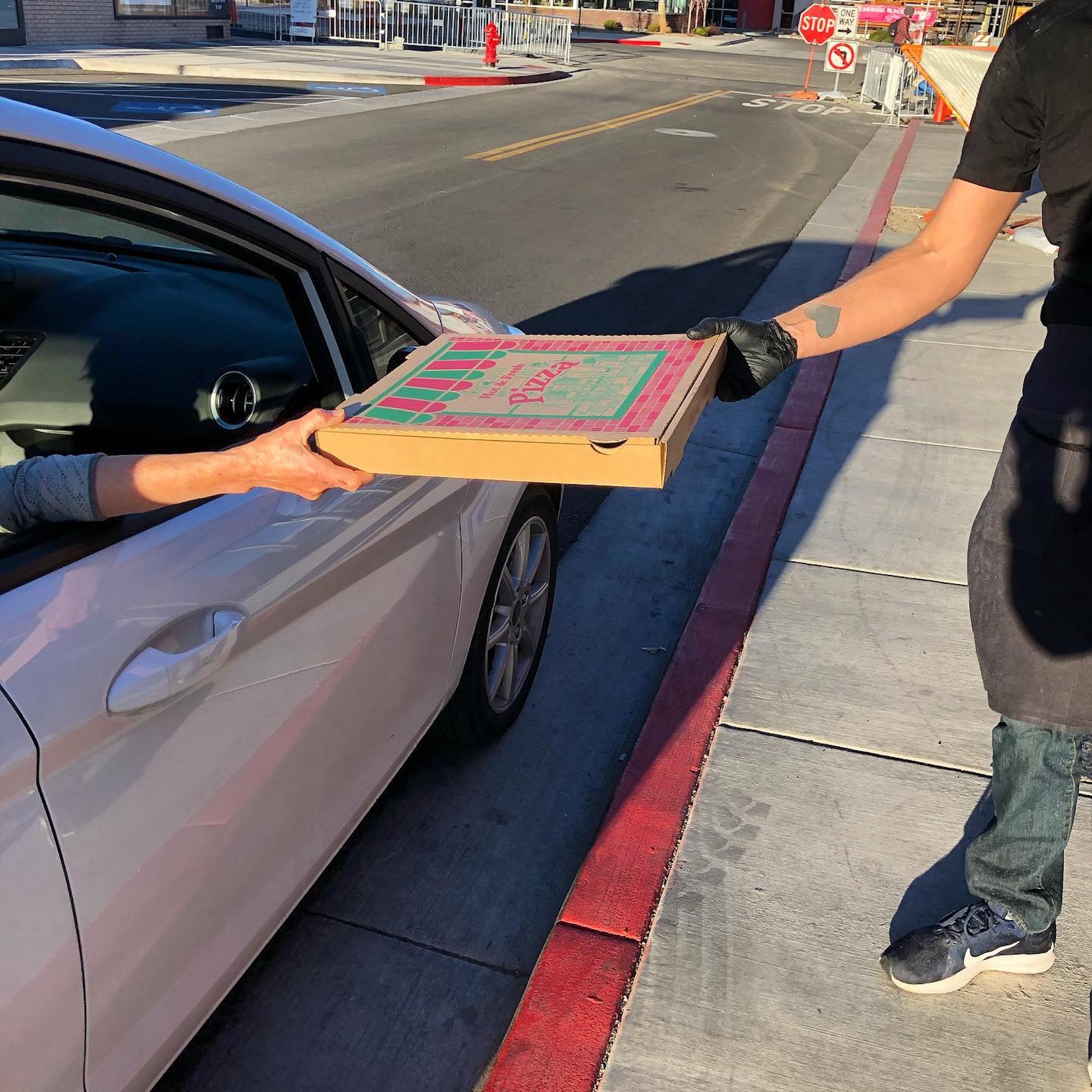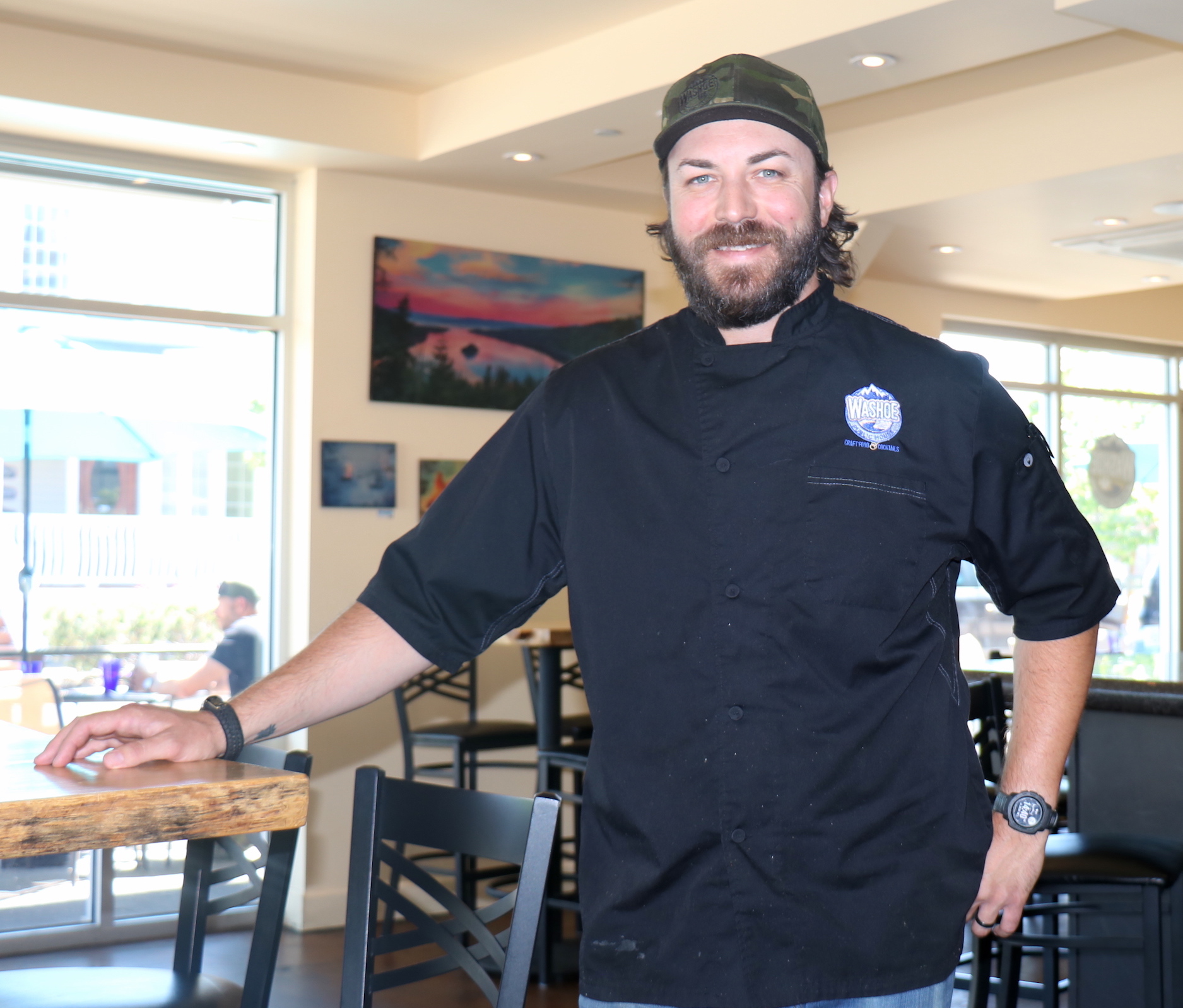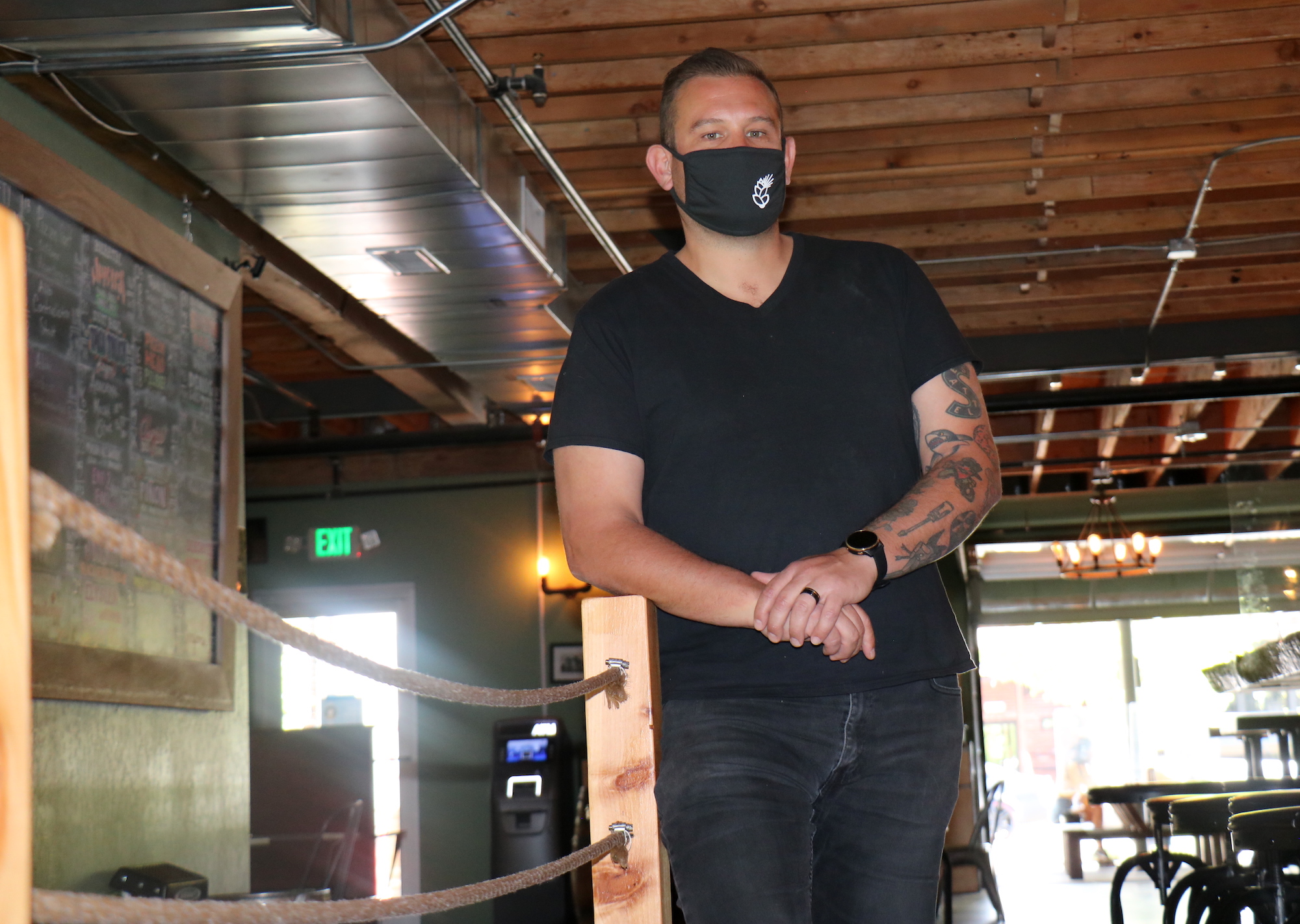You could see the exact moment it hit Aaron Foster that his restaurant, Food + Drink in Reno’s Midtown, might not survive.
It’s at the 1-minute, 5-second mark of a selfie video Foster posted to Instagram on March 13, 2020, the day the Food + Drink owner decided he couldn’t justify keeping his restaurant open amid the health risks posed by the coronavirus pandemic.
“We just opened a month ago,” Foster says, half smiling, while walking around his empty restaurant in Reno’s Midtown.
The tone of his voice shifts from upbeat to uncertain, and the reality of being open for a month before COVID-19 began closing the country and many small businesses like his own, sinks in.
“It’s been a long time coming,” says Foster, his voice catching, during a phone interview this month with the NNBW. “It took me about two years to get this place open. And cost pretty much my life savings. And I don’t want to close, but it would be pretty selfish of me to ask you to come here when I won’t go there (to a different restaurant).”
Foster’s solution? Food + Drink became perhaps the first restaurant in Northern Nevada — still a few days away from all of its bars and restaurants closing — to provide food to customers via a method that would soon become an all-too common term in 2020: curbside pickup.
“I honestly figured I’d do that for a couple weeks, but there was no way I’d generate enough income to pay rent and all that stuff,” Foster recalled “I figured that was just it. It was just bad luck, and I made my peace that this isn’t going to work.”
 Aaron Foster, owner of Food + Drink in Reno’s Midtown, rests after a long day in the kitchen during the pandemic. Courtesy photo
Aaron Foster, owner of Food + Drink in Reno’s Midtown, rests after a long day in the kitchen during the pandemic. Courtesy photo
Foster was wrong. The video, which was viewed more than 1,800 times, led to Food + Drink being overwhelmed with orders for curbside pickup the next day. So much so that, a day after his video post, the restaurant — which initially opened as a pizza and taco joint before pivoting to just pizzas amid COVID — had more than 100 orders during the first 15 minutes of opening the next night.
“In a weird way it ended up being beneficial for me that I really made peace with losing the restaurant right out of the gate,” Foster said. “It sort of freed me up to be like, whatever, every week we stay open is sort of an extra week.”
More than 52 weeks later, Food + Drink is still alive. And while many restaurants have reopened their doors with state mandated capacity limits, Food + Drink has stuck to relying only on curbside pickup throughout the pandemic. The restaurant has expanded its menu to include to-go desserts (like ice cream sandwiches and liege waffles) and a house salad.
In early May, Foster and his team closed up shop for a couple of weeks to rest and recharge. That’s because Food + Drink is preparing to reopen in more ways than one. The restaurant, after 14 months of only serving pizzas to parked cars, plans to start serving customers in its new outdoor dining area on May 27, if the weather cooperates, Foster said. He added that he’s planning to eventually bring back indoor dining, too, but hasn’t decided exactly when.
“I’m excited that things are all moving in the right direction,” Foster said.
 Aaron Foster, right, owner of Food + Drink in Reno’s Midtown, hands off a pizza to a customer who ordered curbside pickup last spring. The restaurant, which opened one month before the pandemic hit, has run on takeout orders throughout the pandemic. Courtesy photo
Aaron Foster, right, owner of Food + Drink in Reno’s Midtown, hands off a pizza to a customer who ordered curbside pickup last spring. The restaurant, which opened one month before the pandemic hit, has run on takeout orders throughout the pandemic. Courtesy photo
It’s a microcosm of the long, winding road that bars and restaurants have been on as they work their way back to packing their dining rooms and pulling in pre-pandemic revenues.
And June 1 will help set the table for a return to normal in Reno-Sparks — for businesses, but also for society. That’s the date bars and restaurants — and all businesses in Washoe County — can drop social distancing limits and return to 100% capacity.
Along the way, many bars and restaurants were forced into adopting some new practices, to unexpected success. Changes, they’ve found, that have been for the best.
Take Washoe Public House in downtown Reno. Pre-COVID, the restaurant had been using third-party delivery provider Uber Eats. While many restaurants relied on or even added those online ordering platforms during the pandemic, Washoe Public House owner and executive chef Brett Moseley decided that was the time to slam the brakes on Uber Eats.
 Brett Moseley, owner of Washoe Public House, stands inside his Downtown Reno restaurant in mid-May. Thanks to pandemic-related changes to his operation, patio seating and loyal customers, Moseley said his business was actually up in 2020 compared to 2019. Photo: Kaleb M. Roedel / NNBW
Brett Moseley, owner of Washoe Public House, stands inside his Downtown Reno restaurant in mid-May. Thanks to pandemic-related changes to his operation, patio seating and loyal customers, Moseley said his business was actually up in 2020 compared to 2019. Photo: Kaleb M. Roedel / NNBW
Simply put, Moseley could no longer justify giving 30% of his delivery profits to a third-party vendor as he tried to keep his business afloat.
“I was losing money by being part of it,” Moseley said. “Before the pandemic, I really thought I needed it, because I thought it was good advertising and convenient for people. But as soon as the pandemic hit, I decided we’ll just pay one of our guys to deliver, we can’t afford to give them 30% right now. And they were unwilling to compromise when we closed.
“That was one of the biggest things … getting angry at third-party delivery services and realizing that I could do it on my own.”
Soon after, Washoe Public House started offering family-style meals, designed for four people at $40 a pop, for delivery and pickup. They were a hit. The restaurant sold about 40 family meals a week, in addition to other menu items, for months during the pandemic, Moseley said.
And once restaurants were allowed to open indoor and outdoor seating at limited capacity, Washoe Public House stayed busy for most of 2020. Having extensive patio seating and a loyal customer base helped, too, he said.
“We actually made more money in 2020 than in 2019,” said Moseley, noting his revenue was slightly up, but didn’t have the exact figure available. “Even with the pandemic, I was able to duplicate 2019, plus a little more.”
THE BAR BLUESFew eating and drinking establishments in Northern Nevada and beyond can say the same. After all, few industries have been hit harder during the pandemic than restaurants and bars.
As such, it should come as no surprise that many were forced to shutter in 2020, but the numbers are still staggering. More than 110,000 restaurants and bars in the U.S. closed for business — temporarily or permanently — last year, with nearly 2.5 million jobs erased from pre-pandemic levels, according to the National Restaurant Association. In all, the industry lost $240 billion in sales in 2020.
 Piñon Bottle owner Radium Sulprizio stands inside his bar in Reno’s Midtown in mid-May 2021. After his bar’s business was down 75% in 2020, Sulprizio has seen sales rebound this spring heading toward June 1, when business can return to 100% capacity in Washoe County. Photo: Kaleb M. Roedel / NNBW
Piñon Bottle owner Radium Sulprizio stands inside his bar in Reno’s Midtown in mid-May 2021. After his bar’s business was down 75% in 2020, Sulprizio has seen sales rebound this spring heading toward June 1, when business can return to 100% capacity in Washoe County. Photo: Kaleb M. Roedel / NNBW
Piñon Bottle, a bar with a strong presence at its flagship location in Reno’s Midtown as well as its location in Victorian Square in Sparks, is one establishment that saw business dramatically decrease starting in mid-March 2020 — the time of year when sales typically take off.
“Getting told to close before St. Patrick’s Day, which is kind of the kickoff to our real lucrative start of the year … needless to say, I drank a few beers that night,” said owner Radium Sulprizio.
From there, Piñon Bottle, among other bars in the state, served drinks to customers in fits and starts, as restrictions and capacity limits fluctuated throughout last year.
As a result, Piñon Bottle’s sales in 2020 dropped roughly 75% compared to 2019, Sulprizio said. And it would have been worse if Nevada had not allowed Reno-Sparks restaurants and bars to sell cocktails and beers for takeout.
Notably, more than 30 states plus the District of Columbia are allowing the sale of cocktails to-go, bottled spirits and wine to-go, or both, and 11 states have made that legislation permanent, according to the Distilled Spirits Council of the United States. Nevada has not passed a statewide measure, but allows it in certain areas, like Vegas and Reno.
“We had a lot of support from our regulars when were just doing to-go,” Sulprizio said. “A lot of regulars would come in, get one beer, and leave like a $40 tip. And you’re like, ‘You sure?’ And they’re like, ‘Yeah, you need this more than I do.’ So there was nice community support.”
This year, as occupancy limits have progressively loosened in Washoe County, Sulprizio said Piñon Bottle has experienced an “inspiring” uptick in business heading into summer.
In fact, Piñon Bottle had its strongest month amid COVID this past April, pulling in about $54,000 in sales — monthly figures the bar was regularly seeing in the springtime, pre-COVID.
“That was encouraging, because we’re still at half capacity,” Sulprizio said. “We’re not out of the woods yet, but we see a light at the end of the tunnel.”
GETTING BACK TO NORMALThat light is a welcome sight to Jaimi Ficco, co-owner of BeerNV in south Reno, who last summer was coming to grips with the idea of being forced to throw in the towel.
“In August, before we were allowed to reopen, I was starting to make a list of my contacts and saying, OK, what’s my next occupation going to be?” Ficco told the NNBW. “We were that desperate.”
Like many small businesses, government-backed loans and city of Reno grants buoyed BeerNV and helped the bar keep the lights (and taps) on. After reopening in August, BeerNV saw a steady flow of customers through the rest of last year. As a result, the south Reno bar’s 2020 revenue was in better shape than it anticipated just five months earlier.
“We were down 55% (compared to 2019),” Ficco said. “And were closed for basically five months, all told, and at 25%-to-50% occupancy for most of the year. Our midweek numbers are still good; it’s our weekends that have taken the biggest hit, which, of course, are the biggest nights for the industry. But, we’re surviving.”
Ficco said BeerNV is optimistic leading up to June 1, but the bar is not getting ahead of itself just yet.
“We don’t want to make plans and have them backfire on us,” Ficco said. “So, we’ll basically wait until the last week of May when someone says, hey, this is what the plan is for June, and then we’ll adapt.
“The analogy has been that it will be like the roaring 20s after the Spanish Flu. We’re hopeful we can just get back to normal. If it’s an explosion of going out and socializing and partying, we’ll absolutely take that. But, if we can just get back to normal, that would be great.”
MASK IMPACTSThe NNBW conducted its initial interviews for this story before the Centers for Disease Control and Prevention said May 13 that fully vaccinated people don’t need to wear a mask or physically distance during most outdoor or indoor activities, large or small.
The same day, Nevada adopted the CDC’s new mask-wearing guidance effective immediately — noting that there would be no requirement for private businesses to check one’s vaccine status — while also noting that businesses, entities and organizations could have mask policies that are more restrictive than the CDC guidance.
In a follow-up email, Piñon Bottle and BeerNV each said they are now allowing patrons who are fully vaccinated to forgo the mask.
“We tried at first to hang on and require masks since there was little guidance of how we should proceed, but it became very difficult for us to police,” Sulprizio said in an email to the NNBW. “There was no real guidance for us to make a decision, so we went with what felt right or OK. Now that there are options to protect oneself, we feel we no longer need to be the governor’s enforcers. Being worried about being reprimand while keeping our guests safe was a daunting task that took a toll. It is nice to let people make their own choice for safety now.”
Ficco echoed that sentiment.
“We are also not asking for verification of vaccination, as it was enough of a fight to get people to wear masks to begin with,” he said in an email. “If unvaccinated people want to forgo masks, it’s their health they’re risking. It’s not an ideal situation, but at this point, we’re tired of babysitting adults.”
Meanwhile, Moseley said Washoe Public House has not changed its policy yet, adding: “We are kind of waiting it out to see what other restaurants are doing.”
 Aaron Foster, owner of Food + Drink in Reno’s Midtown, rests after a long day in the kitchen during the pandemic. Courtesy photo
Aaron Foster, owner of Food + Drink in Reno’s Midtown, rests after a long day in the kitchen during the pandemic. Courtesy photo Aaron Foster, right, owner of Food + Drink in Reno’s Midtown, hands off a pizza to a customer who ordered curbside pickup last spring. The restaurant, which opened one month before the pandemic hit, has run on takeout orders throughout the pandemic. Courtesy photo
Aaron Foster, right, owner of Food + Drink in Reno’s Midtown, hands off a pizza to a customer who ordered curbside pickup last spring. The restaurant, which opened one month before the pandemic hit, has run on takeout orders throughout the pandemic. Courtesy photo Brett Moseley, owner of Washoe Public House, stands inside his Downtown Reno restaurant in mid-May. Thanks to pandemic-related changes to his operation, patio seating and loyal customers, Moseley said his business was actually up in 2020 compared to 2019. Photo: Kaleb M. Roedel / NNBW
Brett Moseley, owner of Washoe Public House, stands inside his Downtown Reno restaurant in mid-May. Thanks to pandemic-related changes to his operation, patio seating and loyal customers, Moseley said his business was actually up in 2020 compared to 2019. Photo: Kaleb M. Roedel / NNBW Piñon Bottle owner Radium Sulprizio stands inside his bar in Reno’s Midtown in mid-May 2021. After his bar’s business was down 75% in 2020, Sulprizio has seen sales rebound this spring heading toward June 1, when business can return to 100% capacity in Washoe County. Photo: Kaleb M. Roedel / NNBW
Piñon Bottle owner Radium Sulprizio stands inside his bar in Reno’s Midtown in mid-May 2021. After his bar’s business was down 75% in 2020, Sulprizio has seen sales rebound this spring heading toward June 1, when business can return to 100% capacity in Washoe County. Photo: Kaleb M. Roedel / NNBW
Comments
Use the comment form below to begin a discussion about this content.
Sign in to comment